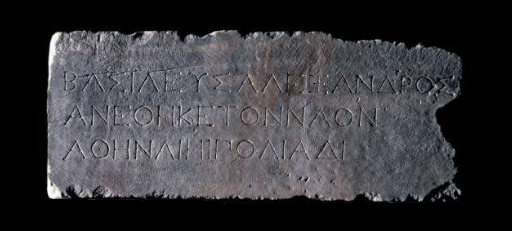8 Alexander's dedication
An understanding of subjects, objects and the definite article will help you to read the second line of Alexander’s inscription from Priene.
Activity 12 Continuing to read the inscription (1)
a.
subject
b.
object
The correct answer is a.
Discussion
‘King Alexander’ in the nominative case is likely to be the subject of the sentence.
What else would you expect the sentence to contain?
Discussion
At a minimum, the sentence is likely to contain a verb telling us what Alexander is doing (or perhaps has done, or will do). Depending on the nature of the verb, there might be an object as well.
The next word is the verb you would be expecting. ΑΝΕΘΗΚΕ means ‘dedicated’.
βασιλεὺς Ἀλέξανδρος King Alexander
ἀνέθηκε dedicated …
Activity 13 Continuing to read the inscription (2)
Try to find ΑΝΕΘΗΚΕ at the start of line 2.
Does the verb raise expectations of an object?
Discussion
Very much so. The word ‘dedicated’ would typically be followed by an object, answering the question ‘What was it that Alexander dedicated?’ ἀνέθηκε is a common word on statue bases and monuments, indicating that somebody has dedicated something, usually to a god or goddess.
Examine the remaining part of the line:
ΤΟΝΝΑΟΝ
This series of letters is actually two words. Using your knowledge of the definite article and case endings, where do you think the word break falls?
Discussion
The break falls between two instances of the letter nu, i.e τὸν ναόν. The letters represent a definite article and its noun.
a.
subject
b.
object
The correct answer is b.
Discussion
The endings of τὸν ναόν indicate that the noun is in the accusative case. It would help to know that ναόν comes from ναός, but the definite article (τόν) is enough to show that the case is accusative. τὸν ναόν is the object that was expected after ἀνέθηκε.
Using the dictionary entry provided, translate the first two lines of the inscription:
βασιλεύς Ἀλέξανδρος
ἀνέθηκε τὸν ναόν
Vocabulary
ναός, -οῦ, ὁ temple
Discussion
The first two lines can be translated:
King Alexander dedicated the temple
The temple in question is the temple of Athena Polias at Priene. These words were inscribed on one of the pillars at the temple’s entrance.
Greek gods were worshipped in a number of guises, Athena ‘Polias’ being the guardian of cities (πόλις = city-state). Other guises include Athena Nike (Victory) and Athena Parthenos (the Virgin), both of whom had temples on the Athenian Acropolis. The Temple of Athena Parthenos is better known as the Parthenon.

